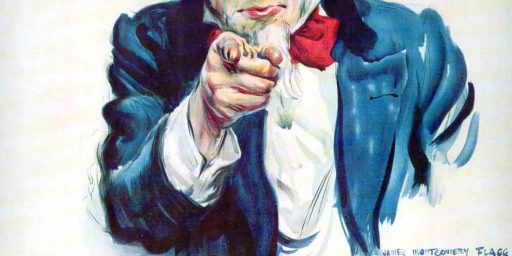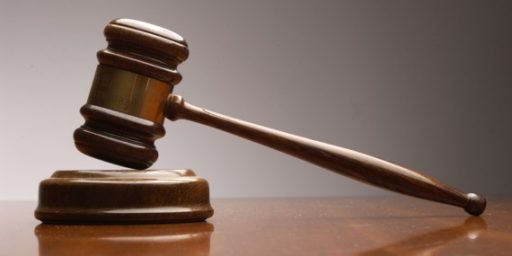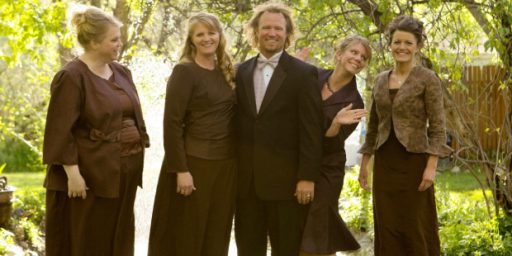Pentagon Policy on Gays Is Challenged
Pentagon Policy on Gays Is Challenged (WaPo – AP)
The Pentagon’s “don’t ask, don’t tell” policy is being challenged by 12 gays who have been separated from the military because of their homosexuality. They planned to file a federal lawsuit today in Boston that would cite last year’s landmark Supreme Court ruling that overturned state laws making gay sex a crime as grounds for overturning the policy. Other courts have upheld the 11-year-old policy, but C. Dixon Osburn, executive director of Servicemembers Legal Defense Network, which is advising the plaintiffs, said those decisions predated the 2003 Supreme Court ruling in Lawrence v. Texas. “We think the gay ban can no longer survive constitutionally,” he said.
*** “Don’t ask, don’t tell,” adopted during the Clinton administration, allows gay men and lesbians to serve in the military if they keep quiet about their sexual orientation and abstain from homosexual activity. The Pentagon’s previous policy barred gays from military service.
The Supreme Court ruled last year that state laws making gay sex a crime were unconstitutional. That overturned a 1986 Supreme Court ruling that had upheld sodomy laws. Two other lawsuits challenging the policy have been filed since the high court’s reversal. One was brought in California by the Log Cabin Republicans, a political organization for gays. Osburn said that group could face a difficult fight because it was not bringing its suit on behalf of a specific injured party. He also noted that a federal appeals court in California has upheld “don’t ask, don’t tell,” but the appellate court in Boston has not ruled on the issue. The other suit was filed in the U.S. Court of Federal Claims, which generally deals with cases that involve money. That plaintiff, who was separated from the Army, is seeking to recover his pension and is challenging the ban in the process. Osburn said the court might rule narrowly on the financial claim and not on the constitutionality of the gay members policy.
It’s far from clear how the Court will rule. For one thing, Lawrence was decided without a majority opinion but instead by a plurality opinion written by Anthony Kennedy and joined by three justices and a concurrence by Sandra Day O’Connor. There is, therefore, no controlling rationale. Kennedy’s opinion was very narrowly focused on whether a state may imprison consenting adults for consensual sexual conduct (in this case, homosexual sodomy) in the privacy of their own homes. O’Connor’s concurrence was narrower still, saying that criminalizing sodomy was within state power so long as it was equally enforced against heterosexual sodomy.
Furthermore, none of the nine justices held that homosexual sodomy was a “fundamental right,” to which strict scrutiny applied when judging restrictions. Indeed, Kennedy–and thus all nine justices–argued that Texas lacked a “legitimate state interest” in criminalizing homosexual sodomy. By inference, then, if the United States government can demonstrate such an interest in support of the “don’t ask, don’t tell” policy, Lawrence would not be controlling.






Just to take the pragmatic approach here, could there not be a way, at least in policy, to separate the act of buggery from the person who is likely to commit it? There are plenty of homosexuals in every branch oft he DoD from the armed forces to the civilian pool who are just as capable with what they have to do. I have a hunch that, given the chance to be open about their nature, there would only be very few who would run about like liberated banshees brandishing sparklers and wearing nothing but feather boas. There’s plenty enough de facto intolerance to “abnormal” behavior to keep that stuff in check.
I know of one, and only one openly gay guy who works in the IT dept of a DoD agency who has Secret clearance. He was in his own words “just so damn gay” that his higher ops had to ask him about it. He was assured he’d keep his job if he didn’t lie to them, and they honored that assurance. He, in turn, does not fraternize with co-workers nor does he engage in any sort of relations while on the agency’s dime, or in their local physical sphere of influence.
“Don’t ask, don’t tell” has to get replaced by something more sensible, methinks.
It is important to remember that “sodomy” and “anti-sodomy” laws are not tied to sexual orientation. Sodomy simply refers to a form of secual intercourse that people of all genders and sexual orientation have. Why the government has any interest in legislating private, consensual behavior, is beyond comprehension for most rational thinkers.
The don’t ask don’t tell policy is absolutely absurd–it is indicative of the lack of concern of human rights that permeates the military culture. I, however, hope they don’t do away with it for more of a practical reason: if the draft is reinstated, it will not be surprising to see thousands of eligible draftees to claim homosexuality to get out of serving. Since homosexulaity is only frowned upon in organizations devoid of moral conscience (i.e. the military) or ones guided by medieval superstitions (e.g. Christian and Islamic Fundamentalism) it could serve as a good way for moral-thinking people to avoid cumpulsory service for unjust and illegal military campaigns.
Hmmm, we could always take another look at that “separate but equal” doctrine. I ‘spect that a whole brigade of avowed lesbians in full combat gear would be a very scary sight, indeed.
When the draft is reinstated, the Klinger approach will still be useful… :-0
But that’s cross-dressing–different issue entirely.
Kappiy:
Your reference to the possibility of the draft tips your hand as to what your politics are… (although blindingly obvious)
So, you think the military is “devoid of conscience”, huh? They have a “lack of concern for human rights”? And what is your experience: being denied enlistment because of YOUR sexual preference?
So you don’t agree with don’t ask don’t tell. Whatever. That doesn’t give you the right to slam those who secure your freedom of speech. You and those like you are a disgrace. You make me want to puke. How can you be considerate of deviants you don’t even know, while being so insensitive to those you know are working for the greater good?
Perhaps you didn’t stop to consider that people in the military, regardless of their sex or “sexual orientation”, are not supposed to be having any discussion about sex at all.